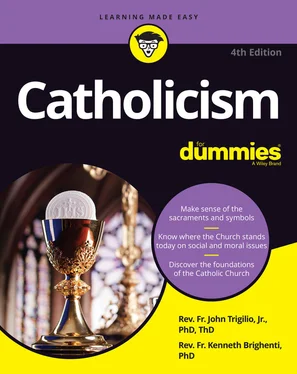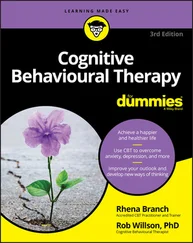Article 9: [I believe in] the holy Catholic Church, the communion of saints. Catholics believe that the Church is more than a mere institution and certainly not a necessary evil. It’s an essential dimension and aspect of spiritual life. Christ explicitly uses the word church ( ekklesia in Greek) in Matthew 16 when He says, “I will build My Church.”The role of the Church is seen as a continuation of the three-fold mission Christ had while He walked the earth — to teach, sanctify, and govern — just as He was simultaneously prophet, priest, and king. The Catholic Church continues His prophetic mission of teaching through the Magisterium (see Chapter 6), the teaching authority of the Church. She continues His priestly mission of sanctification through the celebration of the seven sacraments. And the Church continues His kingly mission of being shepherd and pastor through the hierarchy. The phrase communion of saints means that the Church includes not just all the living baptized persons on earth but also the saints in heaven and the souls in purgatory as well. (See Chapters 8and 9for an overview of the seven sacraments; see Chapter 6for more on Church hierarchy; for more on the communion of saints, see Chapter 18.)
Article 10: [I believe in] the forgiveness of sins. Christ came to save the world from sin. Belief in the forgiveness of sins is essential to Christianity. Catholicism believes sins are forgiven in Baptism and in the Sacrament of Penance, which is also known as the Sacrament of Reconciliation or Confession. (For more on the Sacrament of Penance, see Chapter 9.) Mother Teresa of Calcutta said, “It is not that God is calling us to be successful, rather He is calling us to be faithful.” In other words, Catholicism acknowledges that all are sinners, and all men and women are in need of God’s mercy and forgiveness. The Church is not for perfect people who never sin (perfect people don’t exist anyway) but is for sinners who need the help that religion and the Church provide.
Article 11: [I believe in] the resurrection of the body. From the Catholic perspective, a human being is a union of body and soul, so death is just the separation of body and soul until the world ends and all the dead are resurrected. The just will go, body and soul, into heaven, and the damned will go, body and soul, into hell. Belief in the Resurrection leaves no room for reincarnation or past-life experiences. Catholics believe that you’re unique, body and soul, and neither part of you can or will be duplicated even if human cloning is perfected someday. This tenet is why Christians believe that death isn’t the last chapter in anyone’s life. For the believer, death is a doorway for the soul. The body and soul will eventually get back together again because the body participated in the good that the soul performed or the evil it committed. So the body as well as the soul must be rewarded or punished for all eternity.
Article 12: [I believe in] life everlasting. As Christ died, so, too, must mere mortals. As He rose, so shall all human beings. Death is the only way to cross from this life into the next. At the very moment of death, private judgment occurs; Christ judges the soul. If a person was particularly holy and virtuous on earth, the soul goes directly to heaven. If an individual was evil and wicked and dies in the state of mortal sin, that soul is damned for eternity in hell.WHAT’S IN A LAST NAME?Jesus’s last name wasn’t Christ. So even if mailboxes existed back in His time, a mailbox wouldn’t have listed the names Jesus, Mary, and Joseph Christ. Christ is a title meaning “anointed” from the Greek word christos. The Hebrew word Messiah also means “anointed.”But what if a person lived a life not bad enough to warrant hell but not holy enough to go right to heaven? Catholics believe that purgatory is a middle ground between heaven and earth. It’s a place of purgation, hence the name purgatory. Everyone in purgatory eventually gets into heaven. (For more on purgatory, see Chapter 18.)
Backing Up Your Faith with Reason: Summa Theologica
So, are having faith and hoping to be saved the same as believing in the Tooth Fairy and hoping for a dollar bill under your pillow? Of course not. The First Vatican Council (1869–1879; also known as Vatican I ) taught that you need the intervention of supernatural revelation to be saved, but certain truths, like the existence of God, are attainable on your own power by using human reason.
In the 13th century, St. Thomas Aquinas, a philosopher, explained how the human mind seeks different kinds of truth. He said that
Scientific truth (also known as empirical truth ) is known by observation and experimentation. So, for example, you know that fire is hot by burning your finger with a lit match.
Philosophical truth is known by using human reason. You know that two plus two equals four, for example. So, if two chairs are in a room and someone says, “I’ll get two more,” you know by using reason that the total will be four chairs. You don’t need to count the chairs after they arrive.
Theological truth, known only by faith, is the final and highest level of truth. It can’t be observed, and it can’t be reasoned; it must be believed by faith — taken on God’s word, because He revealed it.
St. Thomas Aquinas also delineated five philosophical proofs for the existence of God in a monumental work called the Summa Theologica. Because Vatican I taught that the human mind can know some things of religion on its own without having to depend on divine revelation, it’s good to see the example given by St. Thomas. Aquinas reasoned that humans can prove the existence of God through motion, causality, necessity, gradation, and governance. Granted, you may not be able to persuade an atheist to become a missionary priest this way, but these proofs are still pretty compelling.
Before you were conceived in your mother’s womb, you were merely a potential being. You didn’t become real, or actual, until the occurrence of the act that created a new human life. Likewise, at one time, everything now in existence was merely potential, because everything has a beginning. In other words, to get to the actual here and now, you first must have an actual beginning — a start. So, at some point, all human beings — and all things — never were.
Some force had to start the motion from potential existence to actual existence. And that force could never have been potential itself; it always was, is, and shall be. Otherwise, that force would’ve had to be started by some other force, which would’ve had to be started by some other force, and so on. This chain of forces means that an actual beginning would never have been. And, again, the here and now must have an actual beginning.
Before the Big Bang, when the universe was only potential, what force started the motion for it to become actual and real? St. Thomas said that the force is God, the Prime Mover — moving the potential universe into becoming the actual one.
Our parents caused us to be born, just as yours did. Our grandparents caused our parents to be born. And so on. So, every cause was first an effect of a previous cause. So, if you go all the way back to the beginning of everything, something or someone had to be the cause of all causes. Just as the force that started the motion from potential existence to actual existence could never have been potential itself, the cause of all causes could never have been the effect of a previous cause. In other words, the cause of all causes was never an effect but always a cause — or, as philosophers put it, an uncaused cause. St. Thomas said that uncaused cause is God. He caused everything to be by starting creation in the first place.
Читать дальше












